It can take a special kind of service to deliver early education and care when the majority of children at the service are vulnerable in one way or another. Barnados Long Day Care Centre faces this challenge. By Camille Howard.
(This article first appeared in Rattler 112, published by Community Child Care Co-operative (NSW). To purchase a copy, go to: www.ccccnsw.org.au/shop)
Earlier this year, the Productivity Commission released its draft report, which suggested scaling back the Child Care Benefit to restrict childcare subsidies for unemployed mothers. Understandably, the response from experts in the education and care sector was swift, with many slamming the proposal and the impact it would have on the most disadvantaged families.
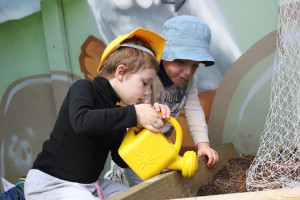
It was news that certainly worried Mary-Anne Bechara, Director of Barnados Long Day Care Centre, Auburn. The 50-place service in Sydney’s west caters for two-to-five-year-olds, many of whom fall into that vulnerable category.
The long day care service is one of several programs run from Barnados Auburn Children’s Family Centre, which includes a temporary foster care program for children before the courts, kin care, family support and preservation, domestic violence and sexual assault counselling, youth support, and an accommodation program for those who are homeless or at risk of being homeless.
In this integrated service environment, with priority of access going to vulnerable families, it’s not uncommon for Barnados Long Day Care Centre to go above their numbers. ‘We often get approvals to go above numbers, to place children who are at-risk,’ Ms Bechara explains.
At the time of writing this article there are 51 children in the service, with seven children who have been placed into temporary foster care by the Department of Family and Community Services (at-risk children from the family support and preservation program), and 11 high-support children with moderate to severe diagnosed disabilities. ‘Currently, about 60-65 per cent of the children in our service are vulnerable children.’
As well as challenges associated with providing services for vulnerable families, Ms Bechara and her team face additional challenges that come from its transient demographic. For example, children in the temporary foster care program tend to be short-term enrolments, while their cases are before the courts, for between three to six months.
It’s even less certain for those children in the family support and preservation program who are on the cusp of being removed from families. ‘Our latest child [in that program] was here for three weeks and a removal happened from the centre here and the child hasn’t returned back.’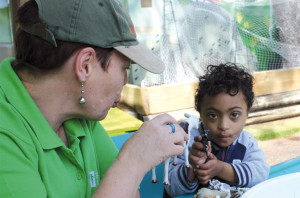
Programming for children who are not in the service for long can be challenging. ‘We just have to start, day one, how we would for any other child,’ Ms Bechara explains. ‘For those children in out-of-home care, or children that are only here for a short period of time, we photograph their time with us and get in some good, quick observations. Not too much because they’re still in a settling in process, usually.’
These photos and observations, however small in number, then go into storybooks—My Life Story Book—that aim to capture a child’s history and identity, and ensure their voice is at the centre of all decision making, something that can be forgotten for children in out-of-home care.
‘It’s really important that they have photos done with their teachers or in the class, and that all gets passed on with them to their case managers,’ Ms Bechara says.
‘We use an online portfolio system here,’ she adds, ‘and while some families don’t have computer access at home, we have a space here that they can use, or we can print off a paper copy. Case managers get a login to the portfolio as well, so if the children do have to move on quite quickly, the case managers from Family and Community Services or their case managers here in out-of-home services, can go on and put in regular updates about what is happening.’
Strong connections with the sponsor body, Auburn Family and Community Services, help Ms Bechara advocate for the importance of education and care and the program the service offers in keeping families together.
‘You can say that you offer respite care one weekend a month, and that will give parents a break, but if you offer childcare five days a week, it takes pressure off those families, especially those with four, five and six kids. Children’s services are vital, given all of our inclusive programs here, in keeping families together. It gives parents a break in the day, it gives them some time to attend parenting groups, go off and do the shopping, gives them a couple of hours at home so they are not this anxious/stressed parent the whole time.
‘And this is why we’re very worried about what the Productivity Commission has said about non-working parents not being entitled to the Child Care Benefit. That scares us because they’re our vulnerable families, they’re the ones who need to be using children’s services.’
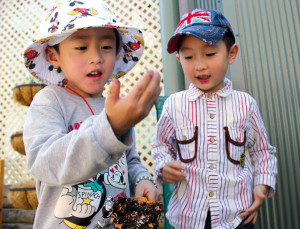 The Auburn area may be poor socio-economically but it’s rich in cultural diversity. ‘I have children of 26 different cultural backgrounds. And I have staff from eight different cultural backgrounds, with about 10 different languages between them.’
The Auburn area may be poor socio-economically but it’s rich in cultural diversity. ‘I have children of 26 different cultural backgrounds. And I have staff from eight different cultural backgrounds, with about 10 different languages between them.’
The service has strong relationships with this diverse community. ‘We see Auburn as our community, but our centre is a little community within itself, as well. And I feel that’s how the local community sees us as well,’ she says.
Children at the centre
While working closely with families and offering as much support as possible, Ms Bechara says the child is at the centre of everything they do in the service. ‘If a family comes in to family support and preservation, we would look at placing the child in long day care,’ she explains. ‘There’s very much a coordinated approach to what we do—we don’t want to send mixed messages to the family.’
Parents also have access to parenting groups, such as Circle of Security, which is an early intervention program for parents and children, plus health and nutrition support, delivered in home languages. And siblings of children in long day care or other programs have access to youth support, too.
‘We look at the needs of all the kids in the family, and the parents. It’s very much about healing and working with the whole family together.’
Even with some 26 years at the service, Ms Bechara says it’s hard not to be affected by the job, and she admits it’s not a job for everyone. ‘It’s very emotional for us. We’re seeing children who have been removed from families,’ she explains. ‘And I think you’re either really made to work in a centre like this, or you’re not—we’ve had people come and work with us and have lasted a month.’
Her team of 15, on the other hand—11 permanent and four additional needs staff—have stood the test of time. ‘They are a really good team where nothing is ever too much. If I said to them, look, we really need to take on 18 high support special needs children, they’d say, “All right, we’ll do it”.
‘They’ve been here a long time, they are very supportive of each other, they look forward to change and they embrace challenges.’
Get with the program
A big proponent of the Early Years Learning Framework, Ms Bechara says that in a service like hers, there are areas of programming that have to have greater focus than others. ‘It’s important that my kids get to come in here and learn self-help skills,’ she explains.
‘For example, some of them have to make their own lunch to start school next year. The priority is to encourage children to develop excellent self-help skills, and become children who are strong and confident.’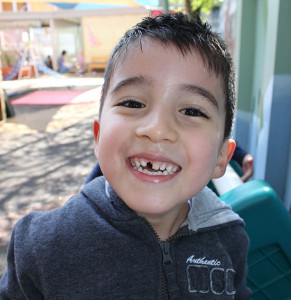
This focus on school readiness is something that starts the moment each child walks through the door. ‘We want to send kids from here who are ready to start school on par with every other child in that class.
‘Research shows that if they can walk in to start school on the front foot, that can carry them through their school years,’ Ms Bechara explains.
The centre has strong relationships with local schools, too, making sure the schools come to the service to hold talks with parents and ensuring the children have a chance to visit their school. ‘And the early childhood teacher who is the support person for children with additional needs attends those schools with the kids when they are attending orientation visits,’ Ms Becahra says.
To ensure a smooth transition, money is raised through corporate sponsorships to provide things like school uniforms, backpacks and school packs for children who need them. ‘We’ll make sure they walk into school that very first day looking the same as every other child; they’ll have their bags packed, their new lunch box and they’re ready to walk in that front door.’
Like all community based services, Barnados LDC relies on fees, Child Care Benefit and Special CCB funding, plus inclusion support subsidy, but still has an income gap. Corporate and other donations are vital. Thanks to corporate support, the preschoolers were just treated to a trip to Sydney Aquarium. ‘My kids wouldn’t get to go and do things like that, so it’s really important that corporate responsibility gets us through,’ Ms Bechara says.
It’s also important to have the full support of Barnados CEO, Louise Voigt. ‘She’s made it very clear that she understands and respects the work we do, and that we should be paid appropriately for the work we do.’
This means staff are paid above award, with added leave entitlements and attractive conditions that go a
long way to retaining staff who face added pressures.
With five children with autism in the service most days, it’s not uncommon for staff to be called back on the floor to help deal with behavioural issues, for example. ‘Sometimes there is pressure on staff, and programming time gets chewed up quickly,’ Ms Bechara explains.
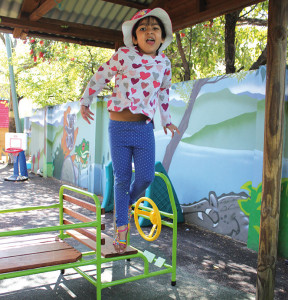 ‘We have children that need to be tube-fed through their tummies—that’s one-on-one time that staff need to do that. We don’t get funded to do one-on-one. There is a support worker to boost numbers in the class, but there is no one-on-one person when those sorts of things need to happen. I’m just lucky I have staff who come in here every day and do a great job. It does get very full on sometimes, but most of the time,’ she says, ‘this is just a normal childcare centre.’
‘We have children that need to be tube-fed through their tummies—that’s one-on-one time that staff need to do that. We don’t get funded to do one-on-one. There is a support worker to boost numbers in the class, but there is no one-on-one person when those sorts of things need to happen. I’m just lucky I have staff who come in here every day and do a great job. It does get very full on sometimes, but most of the time,’ she says, ‘this is just a normal childcare centre.’



No Comments Yet